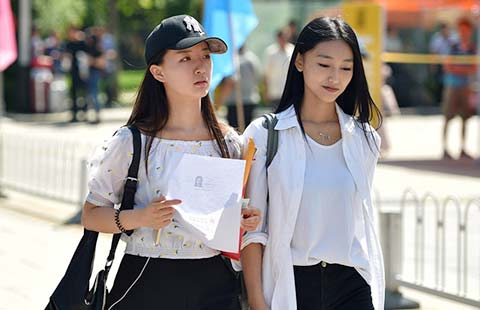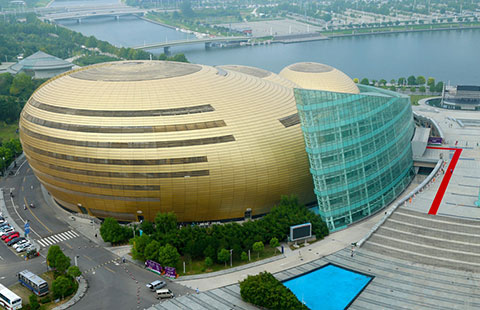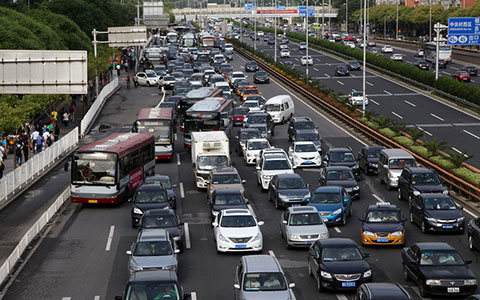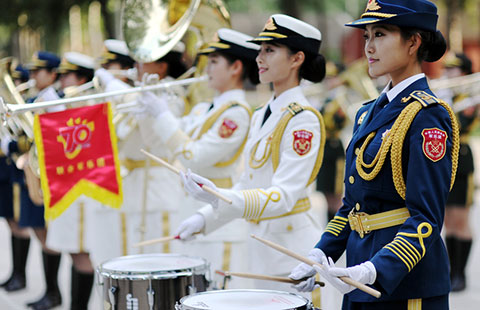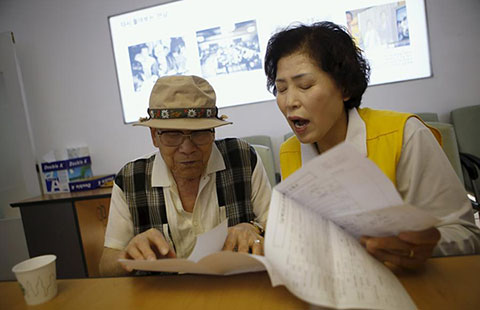

|
The opening ceremony for the fifth Multinational Corporations Leaders Roundtable. Provided to China Daily |
Editor's note: The fifth Multinational Corporations Leaders Roundtable was held in Beijing, June 22 to 23.
This year's theme was "promoting multinational corporations' investment, strengthening corporate social responsibility and facilitating sustainable development."
The following is the speech of the roundtable by Jia Qinglin, chairman of the National Committee of the Chinese People's Political Consultative Conference, and a member of the Standing Committee of the Political Bureau of the CPC Central Committee.
Honored guests,
Ladies and Gentlemen,
Friends:
The cool breeze is refreshing, and the dragon boat dumplings smell delicious. Today on the eve of the Dragon Boat Festival, a traditional Chinese holiday, I am glad to be here at the fifth Multinational Corporations Leaders Roundtable. First on behalf of the Chinese government, I want to congratulate everyone who did a terrific job hosting this roundtable and sincerely welcome all our guests and friends in attendance.
Since 2007, with the energetic support of the United Nations, the active participation of countless people and the tireless efforts of the China International Council for the Promotion of International Corporations, the Multinational Corporations Leaders Roundtable has already met four times.
The roundtable adheres to the UN concept of development; implements the tenets of equality, credibility, cooperation and win-win; brings together people of wisdom; and discusses how to achieve prosperity and development.
It is a high-end platform for exchanges and cooperation between Chinese and foreign multinational corporations, a regular mechanism for Chinese and foreign corporate leaders and government officials to meet and exchange views, and an international economic meeting with considerable influence.
Against the present backdrop of profound and complex changes taking place in the international situation, this meeting takes "promoting multinational corporations' investment, strengthening corporate social responsibility and facilitating sustainable development" as its theme.
This meeting is beneficial to deepening mutually beneficial cooperation between Chinese and foreign multinational corporations, and broadly achieving consensus and meeting challenges together, and it will promote the sustainable development of China's economy and the recovery and growth of the world economy.
As the course of economic globalization constantly deepens, the position and role of multinational corporations in the international economic system becomes ever more prominent.
In 2010, the value added created by multinational corporations reached $16 trillion, roughly 25 percent of the world GDP, their foreign branches accounted for one third of the world's exports, and they hold 93 percent of all patents held by corporations.
The constant growth and development of multinational corporations greatly spurs the overlapping and fusion of all countries' interests and significantly accelerates economic globalization.
The enormous economic power, sustained scientific and technological innovative capability, and broad cultural influence of multinational corporations make them a powerful engine driving global economic and social development and progress.
At the same time, we need to realize that the world political and economic pattern is undergoing profound and complex changes; the global financial crisis is not yet over; the sovereign debt crisis in Europe and the United States is ongoing; a new international economic governance pattern has not yet been formed; the mode of global economic growth is undergoing a profound transition, and a new round of scientific and technological reform and industrial innovation is brewing.
All this poses serious challenges to global economic development, and imposes new demands on multinational corporations to spur economic recovery, promote restructuring, and lead scientific and technological change, but it also contains enormous opportunities for development.
"United we are strong; divided we are weak." In the present situation, it is all the more important to strengthen cooperation among multinational corporations and cooperation between multinational corporations and governments in order to actively respond to challenges and achieve common development!
Ladies and Gentlemen:
In the 30 years since adopting the reform and opening up policy, China has sustained rapid economic development, its overall national strength has increased significantly, people's living standards have risen greatly, and all the undertakings of socialist modernization have achieved enormous successes that have captured the world's attention.
In 2011, China's GDP reached $7.3 trillion, an increase of 9.2 percent over the previous year and more than 16 times the figure for 1978.
During that time, its percentage of the world economic aggregate increased from 1.8 percent to around 10 percent.
At the same time, as China's open economy comprehensively developed, the country's foreign trade and two-way investment increased rapidly and its relations with other countries and regions of the world constantly grew closer.
In 2011, China's imports and exports of goods reached $3.64 trillion, an increase of 22.5 percent, making the country the number one exporter and number two importer in the world. In the ten years since China acceded to the WTO, the country's average customs duties dropped from 15.3 percent to 9.8 percent, and total imports reached $ 8.5 trillion, providing a huge market stimulating other countries' development.
Particularly during the response to the global financial crisis, China introduced a series of policies and measures that not only maintained the steady growth of our own economy, but also provided a powerful stimulus for the recovery of regional and global economies. This was an important contribution.
The period of China's reform and opening up was also a time in which multinational corporations and the Chinese economy became intimately interlinked and developed together.
From starting with simple trade and then extending to comprehensive cooperation in R&D, production and sales; from beginning in economically developed zones on the coast and then spreading to the central and western regions; from concentrating solely on traditional manufacturing industries and then branching off into modern service industries and new- and high-tech industries, the areas of cooperation between multinational corporations and China constantly expanded, the level of cooperation constantly rose, and the returns constantly increased.
From 2001 to 2010, the profits of foreign-funded businesses on their investments in China reached $ 261.7 billion and increased by a yearly average of 30 percent.
In 2010, 21.2 percent of China's tax revenues, 27.1 percent of gross industrial output value, and 53.8 percent of total value of imports and exports came from foreign-funded businesses.
In the course of opening up, Chinese corporations constantly developed and became stronger, and more and more of them mounted the global economic stage.
In 2010, China's foreign direct investment in other countries rose to fifth place in the world.
In 2011, 69 Chinese corporations were among the world's 500 largest.
It is anticipated that during the Twelfth Five-Year Plan period (2011-2015) China's imports will reach $8 trillion and its foreign investment in other countries will reach $500 billion, which will provide great opportunities to the rest of the world. The deep cooperation between China and multinational corporations genuinely is of great benefit to both.
The international community pays great attention to China's economic development.
I would like to take this opportunity to briefly introduce China's current economic situation.
This year, China's economy continued to develop in the expected direction set by macro controls, showed signs of overall stability while slowing, and achieved 8.1 percent GDP growth in the first quarter.
Nevertheless, the problems of China's economic development being unbalanced, uncoordinated and unsustainable became more pronounced, and the economy experienced downward pressure.
On the one hand, this was due to the effect of the global financial crisis, the US and European sovereign debt crisis, and other external factors.
On the other, it was the result of the Chinese government lowering economic growth expectations in order to accelerate the transformation of the pattern of economic development and enhance the quality and efficiency of economic development.
China is still in an important period of strategic opportunities, and the overall international environment is conducive to China's peaceful development.
The huge domestic demand released by China's industrialization, urbanization and agricultural modernization, the increase in overall educational and scientific and technological levels, the improvements to the quality of the labor force, and the constant expansion of the reform and opening up policy have all provided a solid guarantee for China maintaining stable and rapid economic development.
Recently the Chinese government has concentrated on seeking progress while maintaining stability; placed greater emphasis on stable growth; intensified efforts to fine tune and take pre-emptive action using macro controls based on changes to the situation; introduced a series of effective policies and measures such as those on structural tax reductions, optimizing the credit structure, stabilizing and improving export policies, and expanding nongovernment investment; launched a number of major projects that will drive the overall economy; and created a sound policy environment in order to maintain stable and rapid economic development.
Looking at the overall situation with regards China's economic operations, we have the confidence, conditions and ability to achieve this year's objectives.
All this will provide a vast market and development opportunities for enterprises from around the world as well as multinational corporations.
Ladies and Gentlemen:
Today's world is an open world. China cannot develop without the rest of the world, and the rest of the world cannot achieve prosperity and stability without China.
China's economy and the world economy have never been as interdependent as they are today, and China has never been as determined to make greater contributions to the world economy as it is today.
China's past development was reliant on reform and opening up, and its future development will continue to rely on reform and opening up. Facing the world and the future, China's determination to hold high the banners of peace, development and cooperation will not falter; China's strategy of adhering to the basic national policy of opening up for mutual benefit will not change; and China's established policy of strengthening deep-level cooperation with enterprises from around the world as well as multinational corporations will remain the same.
To further promote mutually beneficial cooperation between Chinese and foreign multinational corporations and boost the common development of the Chinese and global economies, I would like to make the following three suggestions.
First, continue to expand bilateral investment. During the Twelfth Five-Year Plan period, China will implement a more proactive opening up strategy, uphold the policy of both "bringing in" and "going global," and improve the quality of the open economy on a larger scale, in wider fields and at higher levels.
I hope foreign multinationals corporations in China continue to increase their investment in modern agriculture, new and high technologies, advanced manufacturing, energy saving, environmental protection, new energy and modern services.
I hope they expand the scale of their investments in the central and western regions, and achieve complementary advantages and cooperation in broader fields.
Chinese multinational corporations must also continue to uphold the principles of equality, mutual benefit and common development; give full play to the comparative advantages of Chinese related industries; expand international cooperation in every field; go global more quickly; and actively promote the economic and social development of host countries while improving their own strengths in order to inject new vitality into a sustainable global economic recovery.
Second, constantly increase cooperation. Integrating the technological advances of multinational corporations with China's labor resources and market advantages not only benefits China's economic restructuring and industrial upgrading but also enhances the international competitiveness of multinational corporations.
We genuinely welcome multinational corporations to adjust the layout of the global industrial chain in China; localize assembly manufacturing, R&D, sales and services, and management and personnel; and explore new ways to cooperate in the areas of trade in services, technology transfers, human resource development and sharing development experience.
I also hope that multinational corporations in China actively call for the easing of controls on exports to China of high-tech products for civilian use, and create new advantages in mutually beneficial cooperation in the course of expanding cooperation on new- and high-technologies and emerging industries.
Third, better fulfill social responsibilities. Fulfilling social responsibilities is an important basis of enterprise evaluations by the international community, an integral part of the core competitiveness of enterprises, and an inevitable requirement for the sustainable development of enterprises.
As global corporate citizens, multinational corporations should play an exemplary role in fulfilling global responsibilities, including economic, legal, moral, charitable and environmental responsibilities; consciously abide by laws and regulations, socials ethics, business ethics and industry regulations; enhance resource conservation and environmental protection; promote knowledge innovation and scientific and technological progress; and actively participate in social welfare undertakings.
Multinational corporations are important vehicles for disseminating culture and have an important responsibility in multilateral cultural exchanges.
I hope multinational corporations will actively promote dialogue, communication and understanding between different cultures so that the world's diverse cultures can coexist in harmony.
Ladies and Gentlemen:
China has an old saying: "Working with one will, people can move Mount Tai." In the course of the current difficult and tortuous world economic recovery, Chinese and foreign multinational corporations should strengthen cooperation to enhance their capabilities.
I sincerely hope Chinese and foreign multinational corporations use this high-end platform of roundtable meetings to strengthen communication, enhance exchanges and deepen cooperation, and join hands to address the new challenges of the times and to make new and greater contributions to the sustainable development of the world economy and human society.
Finally, I sincerely hope the 5th Multinational Corporations Leaders Roundtable will be a complete success.
Thank you.
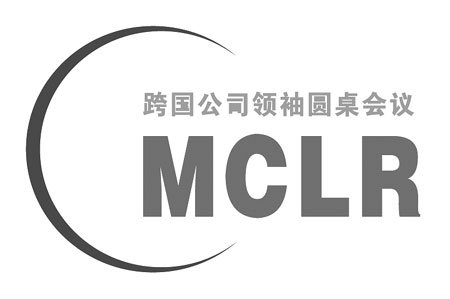
(China Daily 06/27/2012 page5)
